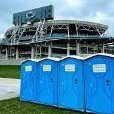Reading more into USADA he seems safe. Brining the prescription doesn't matter but having one and him disclosing it shows transparency.
Establishing Intent
Inadvertent rule violations are relatively rare, but they are possible, and when they do occur they are typically the result of medications or supplements that have been insufficiently researched before using them and which contain a prohibited substance. Significant flexibility has been built into the system to try to ensure that inadvertent rule violations are addressed with less severe sanctions. An athlete can usually qualify for a reduced sanction if they are able to determine the source of his or her positive test and establish a lack of intent to cheat. This is where a properly completed disclosure of medications and supplements used by the athlete can become so important.
The starting point for obtaining that flexibility in the event of a positive drug test is often whether the athlete has made a full and complete declaration of substances used on their doping control form. Frequently, where the athlete has declared a supplement or medication which later turns out to be the source of the positive test, the athlete’s declaration is considered powerful evidence of the athlete’s intent to comply with the rules and leads to a finding that the athlete has not intended to cheat.
On the other hand, when an athlete fails to disclose a substance on their doping control form and tests positive, the failure to disclose can cast doubt on the athlete’s efforts to demonstrate that they were seeking to comply with the rules and this many result in a longer period of ineligibility.
Therefore, it is always in an athletes’ best interest to declare all of his or her supplements and medications – both prescription and non-prescription – during every sample collection process.
Here are just a few more of the reasons why athletes should declare every product, every time








